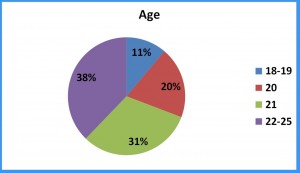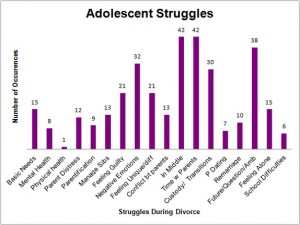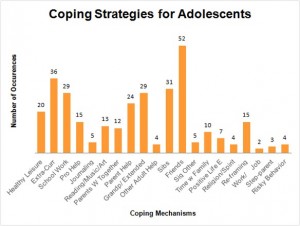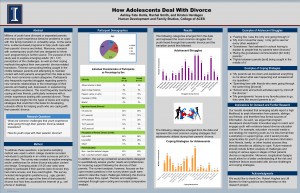by Ashley-Tate Hollis, Rachel Smith, & Kristen Herdegen
Abstract
Millions of youth have divorced or separated parents, and many youth experience behavior problems or cope with this family transition in unhealthy ways. At the same time, evidence-based programs to help youth cope with their parents’ divorce are limited. Moreover, research with contemporary youth that was designed to inform such programming is further scarce. The purpose of this study was to explore emerging adults’ (N = 141) perceptions of the challenges, as well as their coping methods throughout their own parents’ divorce-related transitions. Themes surrounding feeling caught in the middle between parents and attempting to maintain contact with both parents emerged from the data as two of the most commonly coded categories. Participants also frequently reported struggles regarding parent’s new romantic relationships or the remarriage of their parents and feeling sad, depressed, or experiencing other negative emotions. The most frequently mentioned coping aid was friends, particularly someone with a similar experience dealing with parental divorce. These data provide insight into the types of topics and coping strategies that could form the basis for developing outreach efforts for helping youth who are coping with their parents’ divorce.
Research Questions
- What are common challenges that youth experience while going through their parents’ divorce-related transitions?
- How do youth cope with their parents’ divorce?
Methods
To address these questions, a purposive sampling method was used in which college students recruited individuals to participate in an online survey as part of a class project. The survey was created to explore emerging adults’ preferences for online divorce education content and design. Emerging adults (18-25 year olds) were eligible to participate if their parents were divorced, they had online access, and they read English. The survey included demographic questions (e.g., age, gender, ethnicity), as well as age at the time of their parents’ divorce and how they accessed the Internet (e.g., cell phone or desktop).
Sample Characteristics
Table 1. Individual Characteristics of Participants as a Percentage by Sex
Ethnicity Male (N = 24) Female (N = 117)
- African American 4% 3%
- Asian American 8% 5%
- Latino/a 17% 16%
- White 66% 74%
- Biracial 4% 2%
Age When Parents Divorced
- 0-5 years old 33% 25%
- 6-11 years old 33% 31%
- 12-14 years old 17% 25%
- 15-17 years old 13% 9%
- 18-25 years old 4% 10%
Perceptions of Parents’ Divorce Conflict
- High conflict 44% 66%
- Low conflict 39% 26%
- Other 17% 9%
Parent Education
- Mom-less than BA 43% 49%
- Dad -less than BA 43% 55%
Results
The following categories emerged from the data and represent the most common struggles that youth faced through their parents’ divorce and the transition period that followed.
Examples of Adolescent Struggles
- “Feeling like I was the only one going through it.” (Feeling Alone)
- “My mom moved far away, I only got to see her every other weekend.” (Time with parents)
- “Sometimes I feel awkward in school having to explain to people that my parents were divorced.” (Feeling Unique)
- “Being the go-between communication [for both] parents.” (In the Middle)
- “Fights between parents [and] being caught in the middle of it.” (in the Middle).
Coping Strateties
The following categories emerged from the data and represent the most common coping strategies that adolescents utilized during their parents’ divorce.
Examples of Coping Strategies
- “My parents sat me down and explained everything to me about what was happening and answered all my questions.” (parent’s help)
- “Spending time with friends who were going through the same thing [divorce].” (Friends).
- “School work and school activities kept my mind off the divorce.” (School work)
- “My grandparents’ house is my favorite place to go, they were like second parents to us.” (Grandparents & Extended Family Help)
Implications for Practice and Further Research
Our results revealed that emerging adults report a high likelihood to seek information from parents, siblings, and friends, and therefore less formal sources of information. As such, we argue that program developers should foster innovative ways to reach and engage youth with evidence-based divorce education content. For example, education via social media is one strategy for reaching youth as it is less formal than a workshop or support group, and it would provide opportunities for youth to give and receive information from friends, family, or other trusted sources they already describe as utilizing to cope. Future research should include further analysis of challenges and coping at various ages or stages of their parents divorce or separation. Moreover, longitudinal designs would allow for a better understanding of the risk and resilience factors associated with divorce challenges and coping strategies.
Acknowledgements
We would like to thank Drs. Robert Hughes and Jill Bowers for their guidance and leadership on this research project.
Citation: Hollis, A-T., Smith, R., & Herdegen, K. (April, 2015). How adolescents cope with divorce. Poster presented at the the annual University of Illinois at Urbana-Champaign Undergraduate Research Conference, Urbana, IL. Retrieved from http://hdl.handle.net/2142/77694
Link to this page: http://publish.illinois.edu/hdfs-undergraduate-research/2015-undergraduate-symposium/how-adolescents-cope-with-divorce/





